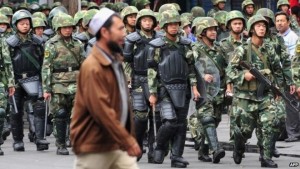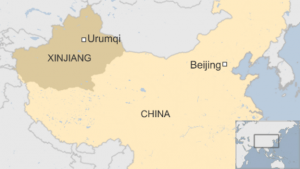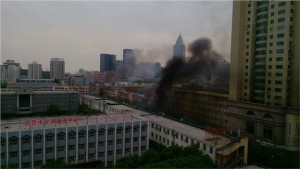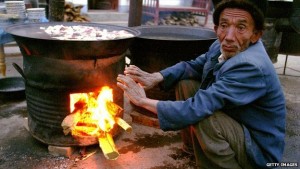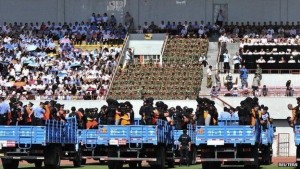China hails crackdown on terror in Xinjiang
BBC, 27 May 2015
BBC China – Chinese authorities say security forces in the western autonomous region of Xinjiang have busted 181 terror groups in an almost year-long operation, with the overwhelming majority thwarted while still at the planning stage.This is the result of a high profile campaign, named “Crack-hard Special Operation”, launched on 23 May last year, a day after suicide attacks killed 39 people in Urumqi, the capital of Xinjiang.
According to Chinese media, the campaign targeting terrorists and religious extremism had become a strong deterrent, with 112 people turning themselves in to the police.
Ordinary people have shown strong support by reporting crimes, the reports add, stressing that legal procedures were strictly followed and the rights of the defendants respected.
It is not clear what Beijing means by a terror group. Access to journalists in Xinjiang is limited, making verification difficult.
Even by Chinese standards, the smashing of such a large number of terror groups is quite staggering.
On the one hand, there were enhanced armed patrols, setting up of check points, networks of neighbourhood watch and “inspection of households”; and on the other hand a de-radicalisation programme was put in place to combat religious extremism, and there was a crack down on the trade in illegal videos and criminals engaged in illegal marriages.
It is worth noting that these reports did not directly mention the fact that there had been a series of attacks in Xinjiang while the “crack-hard” campaign was going on, including the one in Kashgar on 12 October in which 22 people were killed.
There was also a bomb and knife attack on 18 November in Shache prefecture in which 15 people were killed, including 11 attackers.
There was a reference, however, to a security operation in which up to 10,000 ordinary people lent a helping hand, some staking out suspects for seven days in the mountains. This was praised as a shining example of the “people’s war”.
There is no figure as to how many people have been arrested and convicted during the year-long crackdown, but there have been interim reports during the year.
For instance, Chinese media reported that less than two months into the campaign, more than 400 people had been arrested and 40 violent groups smashed.
A number of people have been executed, often after trial proceedings lasting a matter of days.

In June last year, 13 people were executed in Xinjiang for acts of terror, including three who were convicted of a deadly jeep-crash in Tiananmen Square in October 2013.
Twelve more were put to death last October for attacks that left nearly 100 people dead in Shache in July.
About 60% of Xinjiang residents are Uighur Muslims and although ethnic tension has existed for decades, there seems to be an escalation of violent clashes in the past few years.
The Chinese authorities blame a separatist movement, hostile foreign forces and religious extremism for the troubles, while rights groups criticise the government for repression of religious freedom and dissidents in the region.
Amnesty International said in a statement soon after the campaign started: “Ethnic Uighurs face widespread discrimination including in employment, education and housing, and curtailed religious freedom and political marginalisation.”
It criticised the “deplorable” mass sentencing of 55 people at a stadium that month, in front of more than 7,000 people.
“Those responsible for the recent violent attacks have shown a callous disregard for human life and must be held to account. But speedy show-trials will not deliver justice for the victims,” the statement said.
Dilxat Raxit, spokesman for World Uighur Congress based in Sweden, told the BBC that the recent report from Xinjiang simply shows that the crackdown on the Uiguir people had intensified, and the resentment from the people is increasing.
He dismissed the Chinese government’s phrasing of pre-mediated attacks, insisting that conflicts can occur any time where there is provocation, and that the Chinese authorities simply don’t want to shoulder any responsibility for the situation in Xinjiang.


